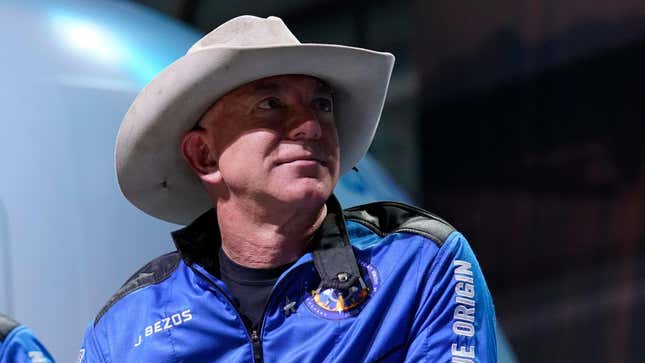
Jeff Bezos—the world’s richest “astronaut” and sour grape—has written an open letter to NASA administrator Bill Nelson, saying Blue Origin will cover billions in NASA costs in exchange for a contract to build a lunar lander that will deliver astronauts to the Moon in 2024.
Fresh from his flight to suborbital space, Blue Origin founder Jeff Bezos is re-setting his sights on the Moon. In April, NASA awarded Elon Musk’s SpaceX with the lone contract to build NASA’s Human Landing System (HLS), prompting Blue Origin and Dynetics—the remaining bidders—to file a protest with the federal Government Accountability Office (GAO). Blue Origin’s main gripe is that NASA backed down on its promise to award multiple contracts.
Blue Origin hopes its protest with the GAO will be the stick that helps it procure a second HLS contract, but Bezos is now offering NASA a carrot—and a very tasty one at that. The Amazon CEO said Blue Origin would waive all payments up to $2 billion in exchange for the contract. The offer “is not a deferral,” he wrote in the letter, “but an outright and permanent waiver of those payments.” To which he added: “This offer provides time for government appropriation actions to catch up.”
To make the carrot even sweeter, Bezos said Blue Origin will contribute to the “development and launch of a pathfinder mission to low-Earth orbit of the lunar descent element,” and at its own cost. This would be in addition to the uncrewed demonstration of the HLS.

Blue Origin, wrote Bezos, would also accept a fixed-price contract for the work and cover any cost overruns, which lol—that’s not much of an incentive given NASA’s expectations for how HLS contracts are supposed to work.
The SpaceX contract is worth $2.89 billion. Blue Origin offered a price tag of $5.99 billion, while Dynetics said its solution would tally somewhere between $8.5 to $9.5 billion. NASA went with a sole provider due to budgetary constraints, as the space agency explained in its source selection statement. The protests filed with the GAO compelled NASA to halt SpaceX’s work on the lunar lander, and a decision on the matter is expected on August 4.
Should NASA agree to award a second contract, it’s not clear if Blue Origin will be asked to requote for the job, or if the $5.99 billion from the original quote still stands. Regardless, the Blue Origin solution is still going to cost NASA—and the American taxpayer—a considerable amount of money. But, again, a second lander is a project that NASA believes is essential.
As Bezos claims in his letter, NASA let SpaceX revise its quote, but it didn’t afford Blue Origin the same opportunity.
“That was a mistake, it was unusual, and it was a missed opportunity. But it is not too late to remedy,” wrote Bezos. “We stand ready to help NASA moderate its technical risks and solve its budgetary constraints and put the Artemis Program back on a more competitive, credible, and sustainable path.”
It’s important to note that Blue Origin is not working alone to build the HLS, as it’s partnered with Lockheed Martin, Northrop Grumman, Draper, and hundreds of small- and medium-sized U.S. companies. NASA awarded the “National Team,” as it’s known, $579 million to advance its concept during the bidding stage, “and we performed well,” writes Bezos. The team came up with a “safe, mass-efficient design that could achieve a human landing in 2024,” he claims. In addition to being safe and sustainable, Bezos says the Blue Origin solution comes with “many benefits,” including the use of liquid hydrogen as fuel, which, in addition to being the “highest-performing rocket fuel” can be mined on the Moon. This feature, he said, “will prove essential for sustained future operations on the Moon and beyond.”
At the same time, SpaceX is planning to use its upcoming Starship as a lunar lander—a solution “tempered by its complexity and relatively high-risk nature,” as NASA describes it, and as Bezos is more than happy to point out.
Bezos is also claiming that, by going with a single vendor, NASA could paint itself into a corner. By not fostering its “original strategy of competitions,” the space agency will “find itself with limited options as it attempts to negotiate missed deadlines, design changes, and cost overruns,” Bezos writes.
This open letter to the NASA administrator is not an official part of NASA’s bidding process, nor is it an official part of Blue Origin’s protest with GAO. Bezos, it would seem, is trying to draw attention to his company’s plight, and to expose what he believes is unfair treatment from NASA. It’s unclear, however, how this letter might impact the Artemis project, especially given the apparent and sudden availability of $2 billion—and without NASA having to ask Congress for any of it.
It’s worth noting that Nelson is very much in favor of a second provider for a lunar lander. Back in June, the newly minted administrator asked Senate appropriators for the extra funds needed to make this happen. NASA needs “some more money to enhance and procure that competition so that there are other players that get involved,” said Nelson in a Washington Post webinar held on July 21, as SpaceNews reports.
Additional funding doesn’t seem likely for the coming fiscal year, and ambiguities about when U.S. astronauts might actually make it to the Moon aren’t helping. The current plan is to execute a crewed landing in 2024, but the Biden Administration, while supportive of the Artemis program, has been noncommittal about this admittedly arbitrary—and looming—timeline.
That Bezos is so committed to the project is hardly a surprise, as the billionaire claims to have developed a fascination with the Moon after watching the Apollo landings as a child. His ego probably took a bruising when his rival, Musk, got the NASA contract back in April, so there’s also that to consider. A new space race has emerged, but who would’ve guessed it would be fought amongst the billionaires.